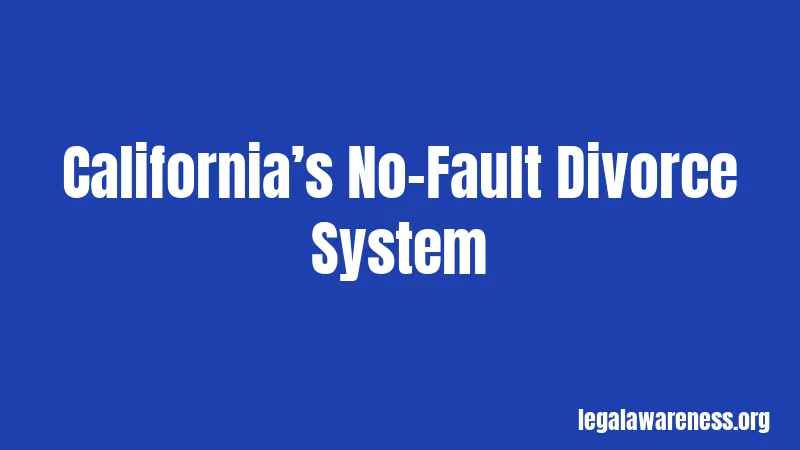Adultery Laws in California (2026): No Crime, Real Consequences
Here’s something that surprises most people. Adultery isn’t illegal in California. Seriously. You won’t go to jail for cheating on your spouse.
But hold on. That doesn’t mean cheating has zero consequences. It can still affect your divorce in specific ways. Let’s break down exactly what happens when infidelity enters the picture in California.
What Is Adultery in California?

Adultery happens when a married person has sexual relations with someone who isn’t their spouse. Pretty straightforward.
California doesn’t have a legal definition of adultery in its criminal code. Why? Because the state got rid of adultery as a crime decades ago. In fact, California was the first state in the entire country to eliminate fault-based divorce back in 1970.
That was over 50 years ago. The old system required proof of wrongdoing to get a divorce. Private detectives. Court testimony. The whole thing was messy and expensive. California changed all that.
Is Adultery a Crime in California?
Nope. Not even a little bit.
You cannot be arrested for adultery. You cannot be fined. You cannot face criminal charges of any kind. California simply doesn’t treat cheating as a crime.
This makes California radically different from some other states. Right now, 16 states still have criminal adultery laws on their books. In Michigan, Oklahoma, and Wisconsin, adultery is technically a felony. In Maryland, it’s a misdemeanor with a $10 fine.
But in California? Nothing. It’s treated as a private family matter, not a criminal offense.
Wondering if this applies to you? If you live in California, adultery will never result in criminal charges. That’s the law.
California’s No-Fault Divorce System

Here’s the deal. California uses a no-fault divorce system.
This means you don’t need to prove your spouse did anything wrong to get divorced. You just need to say you have “irreconcilable differences.” That’s it. The court grants the divorce.
You can’t file for divorce based on adultery in California. It’s not a legal ground for ending a marriage. The only two grounds for divorce in California are irreconcilable differences and one spouse’s permanent incapacity to make decisions.
Most people assume this means adultery doesn’t matter at all. Actually, that’s not quite true. Let me explain where it can still impact your divorce.
When Adultery Actually Matters
Okay, pause. Read this carefully.
While adultery won’t affect whether you get a divorce, it can affect the financial side of things. Specifically, it can matter in three situations.
Property Division Issues
California is a community property state. This means marital assets get split 50/50 in a divorce. Period.
But here’s the exception. If your spouse used marital money on their affair, the court can make them pay it back. This is called “dissipation of marital assets.”
Think about it. Your spouse is spending community money on someone else. Hotel rooms. Expensive dinners. Gifts. Maybe even an apartment for their lover. That money came from the marital estate.
The court can require them to reimburse you before dividing the remaining assets. For example, if your spouse spent $20,000 on the affair, you might get an extra $10,000 to make up for it.
Pretty much every judge will consider this fair. You shouldn’t lose your share of marital property because your spouse was having an affair.
Alimony Considerations
Spousal support in California follows strict rules. Courts must consider 14 specific factors listed in Family Code Section 4320.
Adultery is not on that list. The law focuses on practical things like earning capacity, standard of living during marriage, and ability to pay.
So adultery alone won’t affect alimony. However, there’s an indirect way it can matter.
If your ex-spouse starts living with their new partner after the divorce, this can reduce or eliminate spousal support. California Family Code Section 4323 creates what’s called a “rebuttable presumption.” Basically, if your ex is cohabiting with someone, the court assumes they need less financial support.
Living with someone means sharing expenses. That changes the financial picture. The court can modify the support order based on this new situation.
Child Custody Impact
Courts decide custody based on the best interests of the child. Adultery itself doesn’t make someone a bad parent.
Most of the time, a parent’s affair won’t affect custody decisions. The fact that someone cheated on their spouse doesn’t mean they can’t be a good mom or dad.
But wait, it gets more specific. If the affair actually harmed the children, that’s different. The court will absolutely consider it.
For example, if a parent exposed children to dangerous or inappropriate situations during the affair, custody could be affected. If a parent became completely uninvolved in the child’s life because of the relationship, that matters too.
California Family Code Section 3011 allows judges to consider a parent’s conduct when it affects the child’s health, safety, and general welfare. The key is harm to the child, not moral judgment about the affair.
Can You Sue Your Spouse for Adultery?

No. You cannot sue your spouse for cheating in California.
Some states used to allow “alienation of affection” lawsuits. These let you sue the person your spouse cheated with. California doesn’t have these laws.
Adultery is not a tort in California. This means there’s no civil lawsuit for it. You can’t seek damages just because your spouse had an affair.
Honestly, this surprises a lot of people. Many assume they can take their cheating spouse to court and make them pay. That’s not how California law works.
The only exception is if the affair led to other illegal acts. For instance, if your spouse became violent during or because of the affair, you could sue for assault or battery. If they’re stalking or harassing you, that’s a separate crime.
But the affair itself? Not grounds for a lawsuit.
Special Rules for Military Personnel
Hold on, this part is important.
If you’re in the military, different rules apply. Adultery can be a crime under the Uniform Code of Military Justice, specifically Article 134.
Military personnel can be court-martialed for adultery. This applies even if you’re stationed in California. Federal military law trumps state law in this case.
The military takes adultery seriously because it can affect discipline and order. If you’re active duty military, you need to know about this separate set of rules.
How to Protect Yourself During a Divorce
If you’re dealing with a cheating spouse, here’s what you should do.
First, gather evidence. Get proof of the affair if possible. More importantly, get financial evidence. Bank statements. Credit card bills. Receipts. Anything showing marital money spent on the affair.
This documentation can help you recover those lost funds during property division. You’ll need to show the court exactly how much was spent.
Second, protect your kids. If you have children, make their safety and stability your top priority. Document any concerning behavior. If your spouse’s affair is exposing the kids to unsafe situations, seek temporary court orders.
Third, get a lawyer. Seriously. Divorce involving infidelity gets complicated fast. These cases often become contested instead of uncontested. A good family law attorney can protect your rights and help you navigate the process.
Don’t try to handle this alone. The emotional stress of dealing with a cheating spouse is already overwhelming. Let a professional handle the legal side.
What About Prenuptial Agreements?
Some couples include adultery clauses in prenuptial agreements. These agreements might specify what happens if one spouse cheats.
California courts will enforce prenuptial agreements if they’re properly executed. So if you signed a prenup that addresses infidelity, that agreement could affect property division or support.
The key is having everything in writing and properly documented. Verbal agreements don’t count. The prenup needs to follow all legal requirements to be valid.
If you’re considering divorce and you have a prenup, show it to your attorney right away. It might change the entire picture.
Recent Changes and Current Law
California’s no-fault divorce law has been in place since 1970. There haven’t been major changes to how adultery is treated in recent decades.
The most recent update to Family Code Section 4320, which governs spousal support factors, was in 2018. That update didn’t add adultery as a factor courts must consider.
This tells you something. California’s approach to adultery in divorce is pretty settled. The state continues to prioritize no-fault divorce and equal property division.
Don’t expect this to change anytime soon. The no-fault system is deeply embedded in California family law.
Common Myths About Adultery in California
Let’s clear up some misconceptions.
Myth: The cheating spouse gets nothing in the divorce. Reality: California requires a 50/50 split of community property, even if one spouse cheated.
Myth: Adultery means you automatically lose custody. Reality: Custody is based on the child’s best interests, not parental morality.
Myth: You can sue the person your spouse cheated with. Reality: California doesn’t allow alienation of affection lawsuits.
Myth: Proof of adultery speeds up the divorce process. Reality: Divorces involving adultery often take longer because they’re more contentious.
Most people have these wrong. Don’t base your decisions on assumptions. Get accurate legal information.
What to Do Next
Discovering your spouse cheated is devastating. You’re probably feeling angry, hurt, and confused.
Take a deep breath. You have options.
If you want to file for divorce, you can do so based on irreconcilable differences. You don’t need to prove the affair in court. California makes the divorce process relatively straightforward.
If you want to stay married and work things out, that’s your choice too. The law doesn’t force you to divorce just because adultery happened.
Either way, protect yourself financially. Make copies of all financial documents. Open your own bank account if you don’t already have one. Know what assets exist and where they’re located.
And honestly? Talk to a lawyer. Even a consultation can give you clarity about your rights and options. Many attorneys offer free initial consultations for divorce cases.
Frequently Asked Questions
Can I get a divorce in California because my spouse cheated on me?
Yes, but not directly because of the affair. California only allows no-fault divorce based on irreconcilable differences. Adultery counts as an irreconcilable difference, but you don’t need to prove it happened. You just need to state that you and your spouse have differences that can’t be resolved.
Will I get more money in the divorce if my spouse cheated?
Not automatically. California requires equal division of community property regardless of who cheated. However, if your spouse spent marital money on the affair, you can seek reimbursement for those funds. The court can award you more assets to make up for money wasted on the affair.
Does California still have adultery on the books as a crime?
No. California eliminated criminal adultery laws decades ago. Adultery has not been a crime in California since the state adopted no-fault divorce in 1970. You cannot be arrested, charged, or prosecuted for having an affair in California.
Can adultery affect child custody in California?
Only if the affair directly harmed the children. The court won’t deny custody just because a parent cheated. However, if the affair exposed children to dangerous situations, inappropriate behavior, or caused a parent to neglect their children, custody could be affected. The focus is always on the child’s best interests and safety.
How long do I have to file for divorce after discovering adultery?
California doesn’t have a time limit. You can file for divorce immediately after discovering the affair, or you can wait months or even years. There’s no statute of limitations on filing for divorce. However, gathering evidence of financial misconduct related to the affair is easier when you act quickly.
Final Thoughts
Now you know the basics. Adultery isn’t a crime in California. It won’t automatically affect your divorce outcome.
But it can matter financially if marital money was spent on the affair. It can matter for custody if children were harmed. And it definitely matters emotionally, even if the law doesn’t care about that part.
If you’re dealing with infidelity in your marriage, take it one step at a time. Protect yourself and your kids. Gather your documents. Talk to a lawyer.
You’ll get through this. Thousands of people navigate divorce in California every year. You’re not alone.
References
- California Family Code Section 4320 – Spousal Support Factors – https://leginfo.legislature.ca.gov/faces/codes_displaySection.xhtml?sectionNum=4320.&lawCode=FAM
- California Family Code Section 4323 – Cohabitation and Spousal Support – https://leginfo.legislature.ca.gov/faces/codes_displayText.xhtml?lawCode=FAM&division=9.&part=3.&chapter=2.
- California Family Code Section 3011 – Child Custody Best Interests – https://leginfo.legislature.ca.gov/faces/codes_displaySection.xhtml?lawCode=FAM§ionNum=3011
- Quinn & Dworakowski, LLP – Is Adultery Illegal in California? 2025 – https://www.orangecountyfamilylaw.com/blog/is-adultery-illegal-in-california/
- LegalMatch – Adultery Law in California (November 2025) – https://www.legalmatch.com/law-library/article/adultery-law-in-california.html
